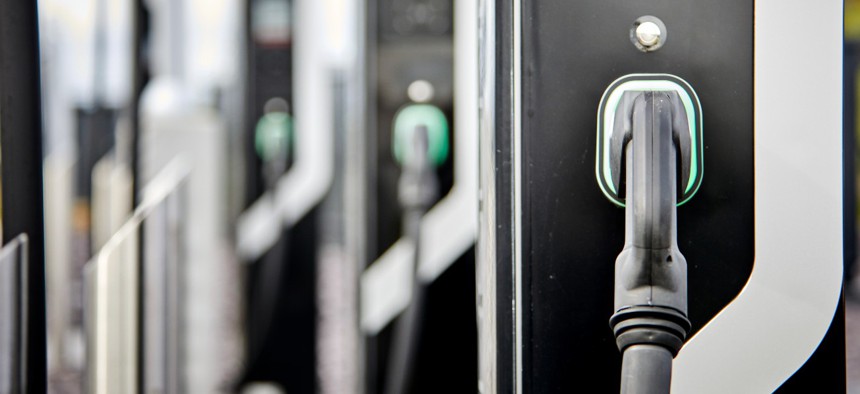
Employees may be allowed to charge their own vehicles at USPS stations. Jon Challicom / Getty Images
Don’t Expect to Charge Your Electric Vehicle at the Stations USPS Plans to Build
The Postal Service may consider making an exception for its own employees to charge their personal vehicles.
There are too many hurdles to allow the public to use the U.S. Postal Service’s forthcoming charging stations to juice up their own electric vehicles, according to the agency and a federal watchdog, even as the agency plans to add the capacity to tens of thousands of its facilities.
USPS should, however, create plans to allow its own workforce to charge their personal vehicles at agency facilities, the Government Accountability Office said, faulting the mailing agency for failing to take a more proactive approach toward offering that benefit. Postal officials said they are open to developing the initiative down the line, but for now must focus on the agency’s needs.
The Postal Service is planning to begin installing and using charging stations at its facilities this year as it begins converting 75% of its fleet to EVs. Postmaster General Louis DeJoy has said it will purchase 66,000 charging stations, one for each of the electric vehicles it plans to buy over the next several years.
While Reps. Stephen Lynch, D-Mass., Gerry Connolly, D-Va., and Jamie Raskin, D-Md., asked GAO to review whether the public could use those chargers for their personal needs, postal officials told the auditors such a plan was not feasible. GAO noted beneficiaries of such a plan could include customers as they conducted business inside a post office, travelers on long-distance trips and community members who simply need a place to charge their car. The watchdog acknowledged concerns from USPS and stakeholders, however, that such a system would create too many challenges. Still, GAO said postal management should develop a better understanding of power capacity at USPS facilities and which locations with public charging would offer the greatest public good.
USPS officials told GAO the roadblocks to allowing the public to use agency chargers ranged from legal and financial to operational. The Postal Service is statutorily prevented from pursuing revenue outside its core business, though they can offer services on behalf of federal agencies. Still, USPS would not be permitted to collect revenue for any effort on behalf of other parts of the government or if it leased out postal property to third parties. The officials also said the initiative would "conflict with or complicate" efforts to efficiently deliver the mail, including by incentivizing customers to spend longer in post offices than is necessary. They noted potential limitations related to parking, staffing to troubleshoot issues and safety for users at night. USPS also expressed concerns about allowing the general public to access its grounds beyond security fences.
Put succinctly, “Postal officials we interviewed did not identify any benefits to USPS of pursuing public chargers,” GAO said. Some stakeholders GAO also spoke with, however, said USPS would be offering a public good that would enhance its reputation and "community relevance."
The Postal Service has explored the possibility of granting its workforce access to its fleet chargers, but so far has not incorporated any efforts to share the equipment in its plans to ramp up its charging infrastructure.
“We charge overnight,” DeJoy told reporters in December. “I don't think the public wants to come wait overnight. And we have secured lots. So that's a whole other strategy. That's for another day.”
Postal officials said the same security concerns would not apply to allowing its own workforce to access its charging network and it would provide a valuable benefit to employees. They also noted, however, that internal survey data has indicated few employees own EVs. The agency would also have to make determinations on when employees could use the chargers and whether the service would be free.
Given those potential hurdles, officials said “they see workplace charging as a possibility at some point in the future [but] they could not predict when, or if, USPS would establish such a program.”
GAO pushed back on that approach, saying the investment USPS is currently making in its charging infrastructure will cost billions of dollars and "affect postal operations for decades."
“As USPS begins to prepare sites and install charging equipment for its electric delivery fleet, it has an opportunity to help ensure these investments take into consideration the potential future needs of employees,” GAO said. “Incorporating the potential for future workplace charging as USPS prepares sites for electric delivery vehicles will better position it to avoid costly future upgrades, potentially provide an employee benefit, and advance sustainability goals.”
Vicki Stephen, executive director of the Postal Service’s Next Generation Delivery Vehicle program, said the agency would explore "any additional initiatives" related to charging infrastructure only after further developing its core plans that align with the USPS mission, according to a GAO summary of her comments. She added, per GAO, that USPS cannot focus on any other goals at this time, as it must primarily focus on delivering mail and packages.
Congress provided $3 billion for USPS to buy more EVs and charging stations as part of the Democrats’ Inflation Reduction Act, which included $1.7 billion for the support infrastructure. The Postal Service initially pledged to only electrify 10% of its new fleet, but significantly increased that rate after a series of lawsuits and negotiations with the Biden administration.







